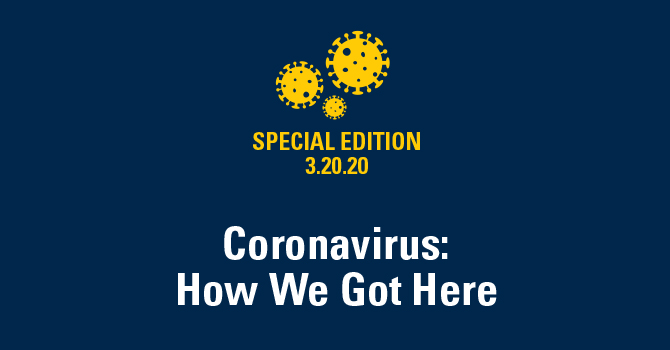Coronavirus: How We Got Here

One month ago, Americans were just learning the term "coronavirus", and now coronavirus seems to be affecting every aspect of our lives. The incredibly rapid rise of the disease has at times created confusion and seemingly conflicting reports. On this special edition of Population Healthy, infectious disease expert and professor of Epidemiology Joseph Eisenberg traces the origins of coronavirus, adds historical context, and explores comparisons to the flu.
Listen to "Special Edition: Coronavirus: How We Got Here 3.20.2020" on Spreaker.
|
Subscribe and listen to Population Healthy on Apple Podcasts, Spotify, Google Podcasts, iHeartRadio, YouTube or wherever you listen to podcasts! Be sure to follow us at @umichsph on Twitter, Instagram, and Facebook, so you can share your perspectives on the issues we discussed, learn more from Michigan Public Health experts, and share episodes of the podcast with your friends on social media. |
Speaker 1: Chances are, your past week has gone something like this: you've had a social gathering you were looking forward to attending cancelled, you stood in line to stock up on groceries, you've laughed a meme about people hoarding toilet paper, you've heard about flattening the curve and you’ve worried that you or someone you love will be diagnosed with coronavirus.
You've also probably heard someone say, or you’ve said it yourself, that you've never seen anything like this response to coronavirus. The quarantines, the cancellations, the constant media coverage. And you've probably wondered “Is this all necessary?”.
Hello and welcome to Population Healthy, a podcast from the University of Michigan School of Public Health. This is the first in a series of special editions of our podcast, focusing on the ongoing coronavirus pandemic.
We talked with Joe Eisenberg, a professor and the Chair of Epidemiology at the University of Michigan School of Public Health, to get his perspectives. He's an expert on infectious diseases.
Eisenberg: This is really unprecedented, historic, given this situation really we haven't experienced before and I think that we need to take it seriously. And I think a lot of the activities that are happening are important. I think that we also need to put it in perspective, and not be panicking.
This is a respiratory disease. It’s transmitted very much like the flu. It's transmissibility seems like it's maybe a little more than the flu but close. It's certainly deadlier than the flu. We don't really know how actually. The mortality numbers are all over the place in the media. We don't really know what it is. It's probably less than what a lot of these reported numbers are because the testing is so narrow to just the serious cases. So I think we need to take this seriously and I think a lot of the activities such as not having big events are important. I think about: there's the high risk, high probability of event kind of activities like big basketball games or amusement parks or even dorms where lots of transmission could be happening, and then there's a lower probability events of touching a button on an elevator or interacting with somebody one-on-one.
We need to be careful and aware that if somebody's coughing and sneezing and sick that people wanna have that social distance that we talk about - three to six feet.
Speaker 1: A new phrase that you've probably added to your everyday conversations in the last week is social distancing. By limiting contact with other people, you limit coronaviruse’s ability to spread. When you do that, you contribute to this concept of flattening the curve - another new phrase for most outside of public health.
Here's a quick refresher on flattening the curve. Coronavirus will continue to spread and infect people. But precautions like social distancing, spread out the number of infections over months rather than weeks. The rising curve of the disease’s spread can flatten out, so that we have a more steady flow of cases. That's what's meant by flattening the curve. For the people who do have severe cases and need medical treatment, we need our healthcare systems to be ready to take care of them. If we all get sick in a short period of time, the healthcare clinics will be heavily burdened with severe cases. That's why governments and organizations are leading the cancellations of gatherings and large events.
Eisenberg: We hope that all this activity, really decentralized kind of interventions that are occurring across the country, will help flatten that curve. And we’ve learned from South Korea, that's the success story, where they did flatten the curve. Part of that was the amazing amount of testing that was available to the public. And then we have Italy where they had a hard time flagging that curve. So we really wanna be more like South Korea, less like Italy in this.
Elderly people with comorbidities, they're the ones that really should be careful and probably self-quarantine. I think in addition to the fact that we're seeing that it looks like this coronavirus has higher mortality than in flus, we don't have a lot of recourse. We don't have vaccines, we don't have antiviral therapy, that we do for the flu. So I think if you're older, if you have any kind of comorbidities, I think you do want to be careful about who you interact with and how do you go about your day.
I think it's, again, amazing how much decentralized interventions that are happening. I mean schools are closing and universities are closing because they see another university closing there by...and it's almost as if the closing of the university is an affections process that's going on. And same with businesses, making decisions to have people work remotely. All of that is decentralized. We don't really have guidance and leadership at some centralized level.
Speaker 1: You've probably also heard coronavirus compared to the flu. In fact, a few weeks ago, you may have said something like, “this isn't going to be as bad as flu season”. But that misses a key point about the similarities and differences between the two.
Eisenberg: All the things that you would do for the flu is what you wanna do for coronavirus. And you probably wanna just be extravagant about those things. I think the flu season, we take for granted. Every year it happens, and the flu season does kill tens of thousands of people a year in the United States alone. But it’s known. And so, we're never quite as fearful of the known as we are of the unknown. And I think that some ways, plays or advantage because then people will be vigilant and do wash their hands and be careful if they're sick and maybe self-isolate themselves and avoid big crowds. So I think that's all kinda very positive and we just wanna make sure we don't take it to two far extreme, and just put it in perspective.
Speaker 1: Other comparisons to corona virus have been the SARS outbreak 18 years ago, or even H-11, about 10 years ago. So the final question for now may be “Will these outbreaks continue to happen more often, possibly fueled by climate change or other factors?”.
Eisenberg: This emergent of this virus happening in China, in what we think was in the wet markets in China and the desire for Chinese to be eating wild animals, is something that's been happening for quite a while. While we saw SARS emerged in 2002, because of that. And now this Coronavirus here in 2020. So there's nothing that I see that would lead us to conclude that this is gonna happen more often.
China's high density, it's always been high density. It's always been the place where we've seen things like avian flu and a lot of “spillover”, movement of pathogens from animals to humans, that occur. But we shouldn't be necessarily concerned that this kind of emergence is gonna happen more often necessarily.
Speaker 1: This has been a special edition of Population Healthy, a podcast from the University of Michigan School of Public Health. During the ongoing coronavirus pandemic, we’ll work to bring you analysis from our community of experts and help you understand what this public health crisis means for you. To stay up-to-date in between special edition episodes, be sure to check out our website, publichealth.umich.edu and follow us on Twitter, Instagram, and Facebook @umich.sph.
In This Episode
 Joseph Eisenberg
Joseph Eisenberg
Professor of Epidemiology at the University of Michigan School of Public Health
Joe Eisenberg studies infectious disease epidemiology with a focus on waterborne and
vectorborne diseases. His broad research interests, global and domestic, integrate
theoretical work in developing disease transmission models and empirical work in designing
and conducting epidemiology studies. He is especially interested in the environmental
determinants of infectious diseases. Learn more.
